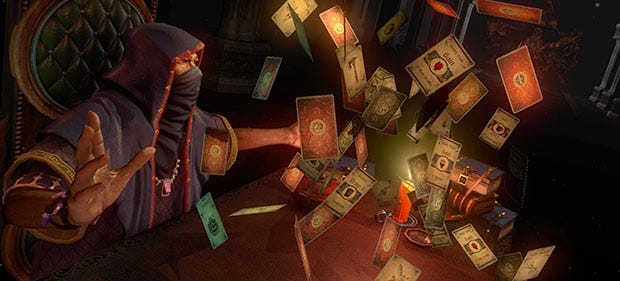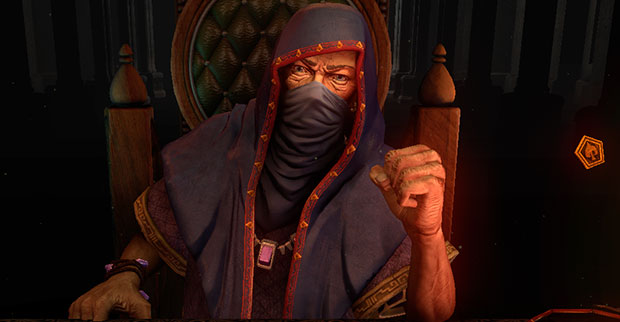Wot I Think: Hand of Fate
"I’m gonna give you what for, Australian Raistlin"
Hand of Fate [official site] is a CCG/roguelite in which a masked, magical figure challenges you to play an increasingly deadly card game against him, switching to high-speed, stabby third-person combat whenever you get into a fight. It's out now.
The reason I so often want to play boardgames despite having a hard drive full of more videogames than I could ever hope to complete isn’t simply because occasional contact with other human beings is unfortunately necessary in order to remember how to talk. It’s because having an opponent who voices their frustration and exhilaration as the game goes for or against them makes it seem so much more than it is. It becomes a true contest, its cards and dice these physical extensions of your will to defeat another lifeform. Videogames, usually, offer us the canned, meaningless soundbytes of a hundred thousand slain foes, but they don’t often offer us a single, overarching opponent who lets slip irritation or indulges in crowing. They’ll often offer us someone we want to defeat because they’re shown to do terrible things or have a skull for a face, but they very rarely offer us someone we want to defeat purely because they are our rival.
There are many things that Hand of Fate does rather well, but the standout is that you spend so much of the game staring at this guy:
I HATE YOU SO MUCH RIGHT NOW.
Throughout the game, before and after almost every action you take, he’ll offer a warning, sneering chastisement or grudging respect. He looks like Raistlin but sounds like Sean Pertwee (though what I strongly suspect to be an Australian accent irregularly breaks through the faux-Brit), and while he’s almost avuncular at times, the desire to defeat this smug SOB who quietly revels in your misfortune can become overwhelming. The cards you draw and transitory enemies you battle are merely a means to that end.
There are so many spoken (and well-written) words here, but all with one aim: sell the character. Where other RPGs (I loosely stick this in there, but there is as yet no safe phrase for what’s an ever-broader genre that flirts with roleplaying essentials) bulk their hours of play up with sprawling, flabby lore and cutscene, this is dedicated to a single cause and backs that up with tight, compulsive mechanics.
This is, for the most part, a masterclass in a single character’s sustained dialogue holding a whole game together. While lines do noticeably repeat by around about Hand of Fate’s halfway point (some three or four hours in, if that’s your metric for a game’s worth, though even then you're very likely to go back and revisit old opponents with new cards in hand), whatever tombola they’re stored in chucks them out in random enough combinations that it really works. You’re not just playing a game, you’re playing a game against a masked dick who thinks he knows it all. DESTROY. And yet, he also feels like an ally in the joy of playing the game. You might be trying to best each other, but you’re experiencing this adventure together.
Hand of Fate does cut to hack’n’slash fantasy combat, using a looser, simpler take on the Batman: Arkham games’ counter/combo system (more on which shortly), but in the main it’s a simulation of a collectible card game. Where something like Magic The Gathering: Duels of the Planeswalkers simply does as this as pretend cards on the screen, this goes all out to show the physical minutiae of play. The little bowl full of tokens, the unused cards pushed to one side, the carry case full of stored decks. It’s all in character, though – you’re duelling a vaguely malevolent wizard in some dark fantasy land, not meeting Ian from Accounts in the darkest corner of The Red Lion.
It’s lovely, it’s appropriately dorky, and it understands that the appeal of board and card games comes from something far more tactile and tangible than the accruement or demolition of numbers. With its regular switching between the table and the battlefield, Hand of Fate blurs the lines between cards-as-combat and actual combat.
Once in a while I wish it would just stick to the cards – because the hacky-slashy stuff feels like a interruption – but I appreciate what it’s trying to do. It’s this sweetly literal interpretation of how our minds create heroic escapades from a dungeon master’s enthusiastic descriptions. File Hand of Fate alongside Community’s Advanced Dungeons & Dragons episode in terms of successfully evoking why this world of pen, paper and imagination can, with the right mindset, explode into something so thrilling. Honestly, it's brilliant.
It’s not just painstaking cardboard simulation and characterful, Aussie-tinged pomposity, of course. There’s also a smart card game with a roguelite structure and regular forays into satisfyingly crunchy combat. The cards are split into exploration, denoting path, places and enemies, and items, which comprise a colourful selection of weapons, armours and magic doohickeys. The smart thing is that your deck and your opponent’s deck are equal but asymmetrical. The more cards you add to yours, the more he adds to his. The stronger yours becomes, the deadlier his becomes. Your deck is dedicated to keeping you alive, his to killing you off. The stakes escalate every time you win, sometimes gruesomely.
A sustained element of chance (some events have a Find The Lady-style choose a card system, with increasingly disastrous outcomes if you pick the wrong card) means it can feel unfair, but equally unexpected victory can be snatched from the jaws of defeat because a couple of cards festoon you with health and wealth. I do prefer Hand of Fate when it’s simply a matter of which card falls next and dealing with the outcome, as the find the lady element can feel like being punished by a shuffle, but it adds more variety to what otherwise might be too simple.
Then there’s the combat, which does feel slightly airlifted in from another game entirely but again switches things up and makes this more than a pretend card game. Whereas an item card or stronger monster in, say, Hearthstone, essentially just means a bigger number when you attack your foe, here you get to actually wield the cool stuff you find or buy. An ice sword isn’t just a drawing on a card, but a big spiky blade which can intermittently fire a cone of ice at a gang of skeletons. A new weapon feels appreciably, tangibly different when you’re walloping goblins, in a way it wouldn’t were it merely a card with +3 written on it.
Some boss fights aside, the combat isn’t particularly challenging – so much of it is about hitting the Counter button whenever a green danger icon pops up – but it’s got a rhythm to it, it throws in a respectable number of randomly-acquired powers and power-ups, and it goes to town on simple, small but evocative environments. Hand of Fate could probably have gotten away with just being that combat game, but that it’s just part of this greater package only makes it more likeable. Part of me would like to play a variant that was cards only, and let my imagination do the work of the fights, but I suspect my mind might have wandered too soon if I had.
Where the wheels can threaten to fall off an otherwise superb cart is that Hand of Fate doesn’t manage to imbue its overall objectives with the meaning of its individual bouts. To dip into for a half hour here and there it holds together beautifully – the meeting up with a mate and challenging each other’s decks ethos – but played in bulk each individual victory has less meaning even though the ultimate aim of beating every ‘boss’ seems woolly. I keep saying this lately, but this is perhaps a reflection of how a critic necessarily plays most games as much as it is some shortcoming in the game itself, so my advice is to limit yourself to a couple of bouts per day rather than try to binge-play Hand of Fate.
This does allude to my deeper concern, not just with Hand of Fate but also with every smart, adventurous roleplaying-esque game that appears somewhere in the Steam top ten in recent months. I don’t feel entirely qualified to get into the formalism debate going on in some quarters of games development (and moreover don’t believe in either/or), but I guess this is sniffing around the territory. Like the similarly excellent, similarly characterful Darkest Dungeon and Sunless Sea, Hand of Fate’s deepest foundations are compulsion loops, knowingly exploiting the human hunger for more and better items and numbers and to keep on cleaning up a map/board/menu until no more options remain. I love that there’s this trend to use a tried and tested design mindset to hook people into playing stuff that then goes to more experimental and thoughtful places, but I’m quietly concerned that there’s a routine forming and that it’s closing the door on emotional connection. Sure, there are plenty of ‘indie’ games which are exploring the latter, but I hope we don’t end up with a hard separation. This is, I suppose, a meta-criticism rather than a significant concern about HoF specifically.
All that said, what makes Hand of Fate so very special is that it does very successfully bring one very human emotion to bear: hatred. I’m gonna give you what for, Australian Raistlin.
Hand of Fate is out now.







